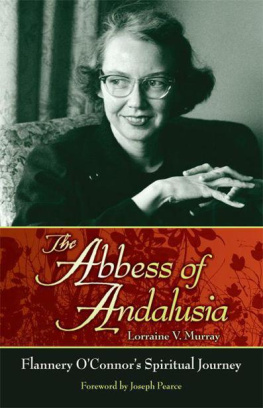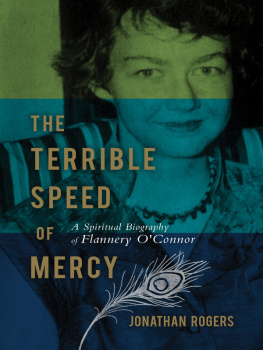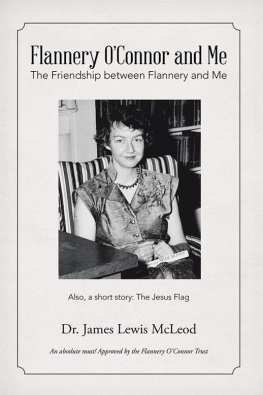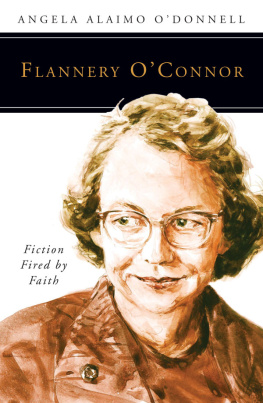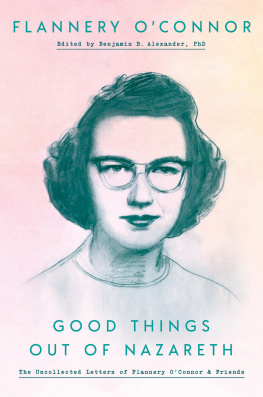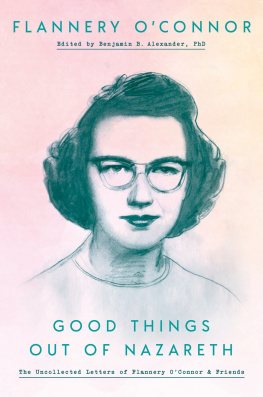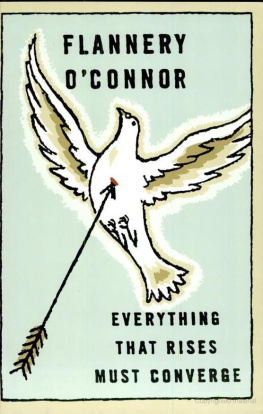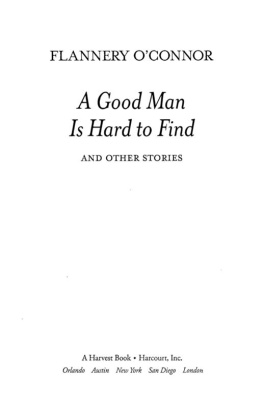The Abbess of
Andalusia
F LANNERY OC ONNORS
S PIRITUAL J OURNEY
The Abbess of
Andalusia
F LANNERY OC ONNORS
S PIRITUAL J OURNEY
By
Lorraine V. Murray
Copyright notices
The Mary Flannery OConnor Charitable Trust granted permission to Lorraine V. Murray to use the following in this book:
Excerpts from: twenty letters written by Flannery OConnor to Betty Hester, ten letters written by Flannery OConnor to Father J.H. McCown, four letters written by Flannery OConnor to the Dominican Sisters of Hawthorne, and one reference to Flannery OConnors Last Will and Testament.
Copyright 1956, 1957, 1958, 1959, 1960, 1961, 1962, 1963, 1964 by Flannery OConnor; Copyright renewed 1984, 1985, 1986, 1987, 1988, 1989, 1990, 1991, and 1992 by Regina Cline OConnor. This permission is non-exclusive, one-time use only, in the English language in North America. All rights reserved.
Excerpts from The Habit of Being: Letters of Flannery OConnor, edited by Sally Fitzgerald, copyright 1979 by Regina OConnor, reprinted by permission of Farrar, Straus, and Giroux, LLC.
To Monsignor Richard J. Lopez and the Dominican Sisters of Hawthorne
And in memory of Mary Ann Long
N ow Flannery is dead and I will write her name with honor, with love for the great slashing innocence of that dry-eyed irony that could keep looking at the South in the face without bleeding or even sobbing.
Thomas Merton
C ONTENTS
T he idea for this book was born the moment that Monsignor Richard Lopez, my dear friend, turned to me one afternoon, as we sat sipping wine on the back porch, and inquired: Have you ever read Flannerys letters? His devotion and admiration for Flannery OConnor kept me going over the next few years, as I read not only the letters, but a mountain of research material. He has my deepest gratitude.
I am also very grateful to Todd Aglialoro of Saint Benedict Press for his astute insights and superb editorial work on the manuscript.
Also high on my thank-you list are Ben Camardi of the Mary Flannery OConnor Charitable Trust for kindly granting me permission to quote from Flannerys unpublished letters; Craig Amason, executive director of Andalusia and the Flannery OConnor-Andalusia Foundation, for giving my husband and me a tour of Andalusia, and then answering my numerous questions via e-mail; and Joseph Pearce and Paul Thigpen, who gave me excellent guidance on an earlier draft of the book.
Along the way, I have made some new e-mail friends, and one is Bill Sessions, who knew Flannery and her mother very well, and was always gracious about replying to my questions. There were also folks in the Flannery OConnor Society who encouraged me, especially Avis Hewitt, Bruce Gentry, Robert Donahoo, and Susan Presley.
A number of priests, sisters, and brothers came to my rescue, and I can never repay their kindnesses. They include the Dominican Sisters of Hawthorne, especially Mother Ann Marie at the Rosary Hill Home in Hawthorne, N.Y., who wrote a lovely letter containing memories about Sister Evangelist, and Sister Mary De Paul, who sent me letters from the archives.
Father Edward J. Romagosa wrote me a letter about his memories of Flannery, while Brother Chaminade Crabtree and Father Luke Kot at the Monastery of the Holy Spirit in Conyers sent information about Flannery and her peacocks. My cousin Father Christopher Viscardi helped me locate materials in the Jesuit house in Spring Hill, Alabama.
Librarians are the unsung angels that make many books possible, and this one is no exception. My appreciation goes to: Nancy Davis Bray in the Special Collections Room at Georgia College and State University in Milledgeville for helping me get information about Flannerys prayer book; Joan E. Gaulene at the New Orleans Province Jesuit Archives in the Monroe Library at Loyola University, for her help with a cache of letters to Father Youree Watson; Michael Carter at the Cloisters, Metropolitan Museum of Art, New York, for assistance in locating the laughing Madonna and Christ Child image.
I also thank Stephen Enniss, Naomi Nelson, Kathy Shoemaker, and Teresa Burk at the Manuscripts,Archives, and Rare Book Library at Emory University for their assistance with Flannerys unpublished letters to Betty Hester; Janie Morris and David Strader at the Rare Book, Manuscript, and Special Collections Library at Duke University for help obtaining copies of unpublished letters to Father McCown; and Tracy Powell and Pat Ziebart at the Pitts Theology Library at Emory University for cheerfully helping me find magazine articles.
Special thanks go to the interlibrary loan specialist in the Pitts Theology Library my husband, Jef Murray for getting me a copy of the exact edition of the prayer book that Flannery used. He also made excellent suggestions on an early draft, fed me delicious meals and homemade wine, and encouraged me when the footnotes threatened to overwhelm me.
I also very much appreciate Dr. M. Patrick Graham, director of the Pitts Theology Library, for approving the purchase of books necessary for my research, and Dr. John Weaver and my other colleagues for their interest in the project.
I thank everyone who prayed for me as I wrote this book, especially my sister and brother-in-law, Rosemary and Dick Mende, my nieces, Christina Edgar and Jennifer Metcalf, my nephew, Rick Mende, my aunt, Rita Pope, my best friend, Pam Mottram, and my cousin Julie Anderson. Im also grateful for prayers offered by the Dominican Sisters of Hawthorne, the brothers at the Monastery of the Holy Spirit, Mary Anne Castranio and Gretchen Keiser at The Georgia Bulletin, and my faith community at St. Thomas More Church in Decatur, Georgia.
O ne of the most memorable characters to emerge from the gargoylesque pen of Flannery OConnor is The Misfit in A Good Man Is Hard to Find. He is savagely psychopathic and yet, at the same time, savagely sane. I call myself The Misfit, he said, because I cant make what all I done wrong fit what all I gone through in punishment. In perceiving himself as a hapless victim of injustice, he appears to be a kindred spirit with that other madman, King Lear, who declared himself a man more sinnd against than sinning.
The problem with which The Misfit struggles, in his case unsuccessfully, is the conundrum at the heart of life itself. Why do we suffer, and are we more sinned against than sinning? This was the conundrum at the very crux of G.K. Chestertons novel The Man Who Was Thursday, which explores the minds quest for meaning in the face of seemingly meaningless suffering. At the novels end, the mysterious figure of Sunday emerges as a figure of the Divine, accused of inflicting so much apparently senseless pain. He is asked, Have you ever suffered? to which he replies with the words of Christ: Can ye drink of the cup that I drink of?
Although Sunday answers the question with another question, his question is the answer. It is the suffering of God Himself that makes sense of all suffering, and it is through Christs suffering that Christians find meaning and purpose in their own. This axiomatic truth is at the sacred heart of the Christians acceptance of suffering, an acceptance which Chestertons friend, Maurice Baring, conveyed with sublime eloquence through the words of a character in Darby and Joan , the final novel he wrote before his own slow and painful death from Parkinsons disease:
One has to accept sorrow for it to be of any healing power, and that is the most difficult thing in the world... A Priest once said to me, When you understand what accepted sorrow means, you will understand everything. It is the secret of life.1
This secret of life had been discovered by Fyodor Dostoevsky, who believed that his life had been positively transformed by his sufferings as a prisoner: It was a good school. It strengthened my faith and awakened my love for those who bear all their suffering with patience.2 Dostoevskys great literary compatriot, Alexander Solzhenitsyn, underwent a similar transformation through his experience in the Gulag and, most particularly, through his near-death experience with cancer. By any stretch of the imagination, Solzhenitsyns real-life experience of suffering at the hands of unjust jailers eclipses any injustice that we can imagine was suffered by The Misfit, yet, unlike The Misfit, Solzhenitsyn not only accepted his suffering but was grateful for its healing qualities.

